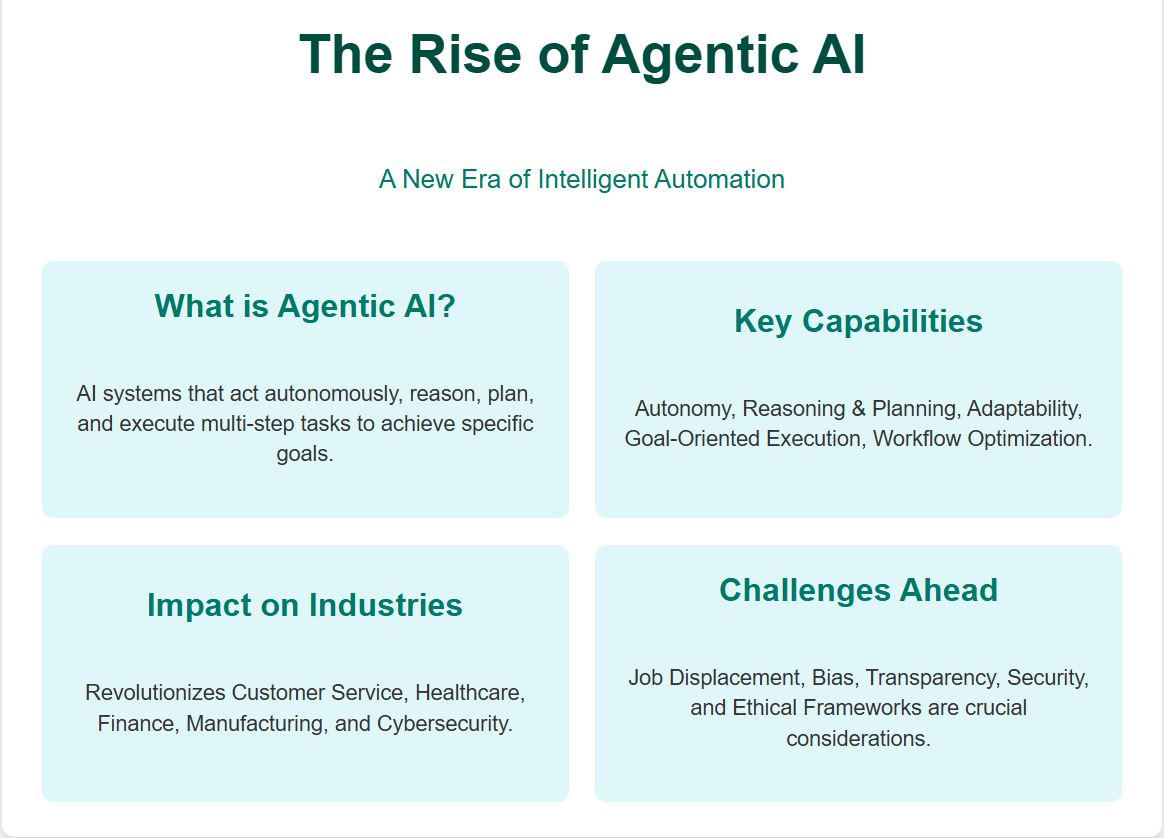The Rise of Agentic AI: A New Era of Intelligent Automation

- India Startup Review
- 01 Jul, 2025
Beyond Generative AI
While generative AI has captured headlines with its ability to create text, images, and other media, a new paradigm is emerging: Agentic AI. Unlike generative models that primarily focus on content creation, Agentic AI systems are designed to act autonomously, reason, plan, and execute multi-step tasks to achieve specific goals with minimal human intervention [2, 6]. This represents a significant leap forward, moving AI from being a tool for content generation to an active participant in problem-solving and decision-making.
Core Concepts and Capabilities of Agentic AI
Agentic AI systems are characterized by several key capabilities that enable their autonomous operation:
•Autonomy: The ability to operate independently and make decisions without constant human oversight [5, 6]. This includes initiating actions, adapting to new information, and self-correcting errors.
•Reasoning and Planning: Agentic AI can analyze complex situations, understand context, and formulate multi-step plans to achieve desired outcomes [2, 8]. This involves breaking down large problems into smaller, manageable tasks.
•Adaptability and Learning: These systems can learn from interactions and data, continuously refining their strategies and improving performance over time [2, 9]. This allows them to handle dynamic environments and unforeseen challenges.
•Goal-Oriented Execution: Agentic AI is designed to pursue specific objectives, taking the necessary actions to reach those goals efficiently [6]. They can prioritize tasks and allocate resources effectively.
•Workflow Optimization: By analyzing vast amounts of data in real-time, Agentic AI can identify bottlenecks, optimize processes, and streamline workflows across various domains [3, 5].
Unlike traditional AI, which often requires explicit instructions for every step, Agentic AI can interpret high-level objectives and devise its own execution path. IBM highlights that Agentic AI focuses on decisions rather than solely creating new content, and does not require constant human prompts or oversight [4].
Impact Across Industries
The advent of Agentic AI promises to reshape numerous industries, driving efficiency, innovation, and new possibilities:
•Customer Service: By 2029, Gartner predicts that Agentic AI will autonomously resolve 80% of common customer service issues without human intervention, leading to a 30% reduction in operational costs [9]. This will free up human agents to focus on more complex and empathetic interactions.
•Healthcare: Agentic AI can analyze vast amounts of medical data to identify patterns, predict disease outbreaks, and assist in personalized treatment plans. It can also optimize hospital operations and drug discovery processes [7].
•Finance: In the financial sector, Agentic AI can enhance fraud detection, automate trading strategies, and provide personalized financial advice. Its ability to process and analyze real-time market data can lead to smarter decision-making and risk management [2].
•Manufacturing and Logistics: Agentic AI can optimize supply chains, manage inventory, and automate complex manufacturing processes. In logistics, it can predict potential bottlenecks and optimize delivery routes, leading to increased efficiency and cost savings [3, 5].
•Cybersecurity: Agentic AI can proactively identify and neutralize cyber threats by continuously monitoring networks, detecting anomalies, and responding to attacks in real-time. This significantly enhances an organization's defensive capabilities [7].
Overall, Agentic AI offers the potential to unlock new levels of productivity in service operations and streamline business processes, allowing employees to focus on strategic initiatives [4, 6].
Challenges and Ethical Considerations
While the potential benefits of Agentic AI are immense, its widespread adoption also presents several challenges and ethical considerations that need to be addressed:
•Job Displacement: As Agentic AI automates more tasks, there is a concern about job displacement, particularly for roles involving routine and predictable tasks [3]. Society will need to adapt and retrain its workforce for new roles that complement AI capabilities.
•Bias and Fairness: If not carefully designed and monitored, Agentic AI systems can perpetuate and even amplify existing biases present in the data they are trained on. Ensuring fairness and preventing discriminatory outcomes is crucial.
•Transparency and Explainability: The autonomous nature of Agentic AI can make it difficult to understand how decisions are made, leading to a lack of transparency. Developing explainable AI (XAI) techniques will be vital for building trust and accountability.
•Security and Control: Granting AI systems autonomy raises concerns about security vulnerabilities and the potential for misuse. Robust security measures and clear control mechanisms are necessary to prevent unintended consequences.
•Ethical Frameworks: The rapid advancement of Agentic AI necessitates the development of comprehensive ethical frameworks and regulations to guide its development and deployment responsibly [10]. This includes addressing issues of accountability, privacy, and human oversight.
Conclusion: The Future is Agentic
Agentic AI marks a pivotal moment in the evolution of artificial intelligence. By empowering AI systems with autonomy, reasoning, and the ability to execute complex tasks, we are moving towards a future where AI can proactively assist in solving real-world problems. While challenges related to ethics, job impact, and control need careful consideration, the transformative potential of Agentic AI to enhance productivity, drive innovation, and reshape industries is undeniable. As this technology continues to mature, fostering responsible development and deployment will be paramount to harnessing its full benefits for society.
References
[1] Simplilearn.com. (2025). 25 New Technology Trends for 2025. Available at: https://www.simplilearn.com/top-technology-trends-and-jobs-article
[2] Aisera. (n.d.). What is Agentic AI?. Available at: https://aisera.com/blog/agentic-ai/
[3] UiPath. (n.d.). What is Agentic AI?. Available at: https://www.uipath.com/ai/agentic-ai
[4] IBM. (n.d.). Agentic AI vs. Generative AI. Available at: https://www.ibm.com/think/topics/agentic-ai-vs-generative-ai
[5] Moveworks. (n.d.). What is Agentic AI?. Available at: https://www.moveworks.com/us/en/resources/ai-terms-glossary/agentic-ai
[6] Oracle. (2025). What Is Agentic AI?. Available at: https://www.oracle.com/artificial-intelligence/agentic-ai/
[7] Exabeam. (n.d.). Agentic AI: How It Works and 7 Real-World Use Cases. Available at: https://www.exabeam.com/explainers/ai-cyber-security/agentic-ai-how-it-works-and-7-real-world-use-cases/
[8] Workday US. (n.d.). What Is Agentic AI? Definition, Types, Examples. Available at: https://www.workday.com/en-us/topics/ai/agentic-ai.html
[9] Gartner. (2025). Gartner Predicts Agentic AI Will Autonomously Resolve 80% of Common Customer Service Issues Without Human Intervention by 2029. Available at: https://www.gartner.com/en/newsroom/press-releases/2025-03-05-gartner-predicts-agentic-ai-will-autonomously-resolve-80-percent-of-common-customer-service-issues-without-human-intervention-by-20290
[10] Computer.org. (2025). The Rise of Agentic AI: Implications, Concerns, and the Path Forward.
Leave a Reply
Your email address will not be published. Required fields are marked *



.png)
